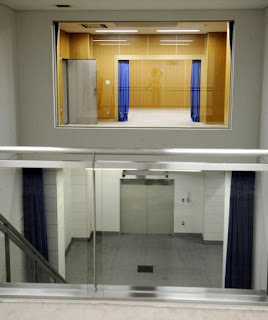 |
| Gallows at Tokyo Detention Center |
The nation's top court has upheld the death sentence of a man convicted of arson in which 5 people died.
The Supreme Court on Tuesday rejected Sunao Takami's appeal against a lower court ruling in the 2009 case, in which he poured gasoline on the floor of an Osaka pachinko parlor and set it alight. The sentence is now set to be finalized.
The presiding judge, Toshimitsu Yamasaki, said the 48-year-old Takami carries an "extremely grave liability for committing a premeditated, indiscriminate murder that targeted a pachinko parlor on a Sunday, when it was expected to draw a large crowd."
The top court's 5-justice No. 3 Petty Bench said the death penalty is justified for Takami, despite certain circumstances being in his favor. These include the fact that he surrendered to authorities on the day following the attack.
According to rulings by the Osaka district and high courts, Takami set the gaming parlor in Osaka's Konohana Ward on fire on July 5, 2009, killing 5 people and injuring 10 others.
Takami's defense counsel argued that execution by hanging is a cruel punishment that runs counter to the Constitution. The country's supreme law forbids cruel punishments and torture by public officials.
But the top court's petty bench dismissed this argument, noting that the Supreme Court has in the past upheld the constitutionality of capital punishment.
In a 1955 ruling on execution by hanging, the top court declared that it was constitutional and is not considered a cruel punishment for most serious crimes.
In handing down the ruling on Takami's case in October 2011, the Osaka District Court's presiding judge, Makoto Wada, noted that there is "controversy" over whether death by hanging is the best way to punish a person, but he added that "the death penalty system in the first place entails that a person pay for his or her crime with death. Agony and cruelty to some extent are inevitable."
Meanwhile, the Supreme Court played down the defense counsel's assertion that Takami was delusional at the time of the attack and in a state of diminished capacity, saying that while such a state of mind does affect the motives of someone accused, it cannot be considered a major factor in this case.
It was the 1st time lay judges participated in a decision regarding the constitutionality of capital punishment.
The Osaka High Court upheld the lower court's ruling in July 2013.
Source: The Japan Times, Feb 24, 2016










